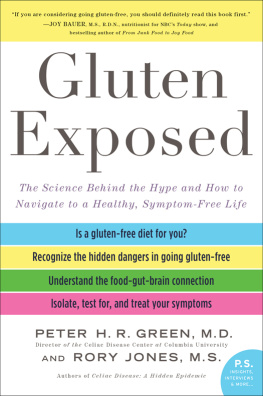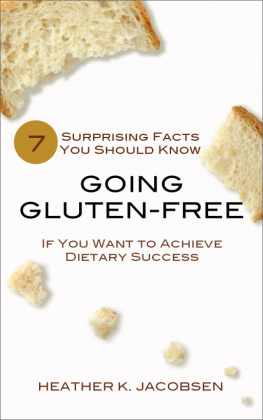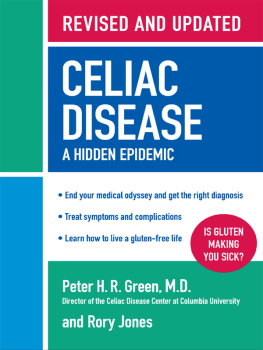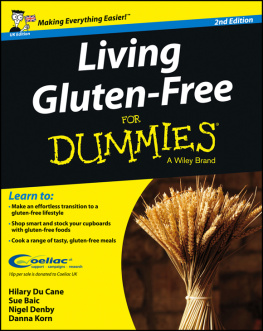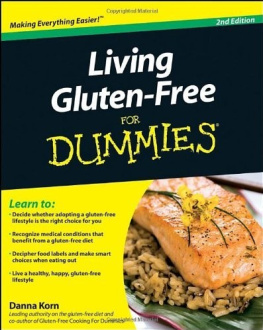All the information in this book is based on current scientific knowledge about the effect on the body of gluten and the many foods, drugs, and supplements that we ingest. It is derived from an in-depth analysis of current medical literature, extensive clinical experience, patient and professional interviews, as well as ongoing research into the various manifestations and conditions ascribed to gluten-related disorders.
Other medical experts may have differing opinions and interpretations of the medical literature. Wherever pertinent, the authors have attempted to note conflicting points of view on key issues as well as topics that have not as yet been scientifically resolved.
Many of the peer-reviewed articles we have consulted may not be readily accessible to all readers. For this reason, we have not included footnotes for all medical facts and figures. Instead, we have listed good basic review articles and books for different subjects in the appendices.
All references to the Center refer to the Celiac Disease Center at Columbia University.
NOTE: This book is not a self-diagnosis manual. It is intended to generate informed patients who know what questions to ask of their physicians and how to understand the answers.
The fewer the facts, the stronger the opinion.
ARNOLD H. GLASOW
Simple solutions are always appealing. In the last few years, gluten has become the ultimate villainthe Wicked Witch, Darth Vader, the Joker, and Hannibal Lecter rolled into one devouring multisystem ravager. It is blamed for draining our brain, blowing up our bellies, invading our nervous system, and setting fire to our guts. A recent bestselling book claimed that: Brain disease can be largely prevented by the choices you make in life... If only it were that simple.
Almost a third of all American and UK consumers are trying to avoid gluten. By any reckoning, a significant portion of the buying public is focused on the gluten in our food supply and on their plates.
Gluten is implicated in everything from heart disease, neuralgia, sore muscles, exhaustion, brain fog, headaches, autism, diabetes, arthritis, curious rashes, schizophrenia, dementia, weight loss, fibromyalgia, and irritable bowel syndrome to plain it makes me feel sick-itis. Yet most of these claims do not hold up.
In fact, it has become increasingly hard to swallow the story line written by the media as well as friends, family members, and various alternative health care professionals. The menu at this feast of confusion includes wheat and the different proteins within it, genes, germs, fungi, antibiotics, herbicides, enzymes, supplements, and anything else that travels through the intestinal tract. It is a multicourse, multisystem, increasingly nonscientific boiling pot.
Unfortunately, the food industry and general population got onto a gluten-free diet ahead of the medical community, which is now playing scientific catch-up. With the advent of the Internet, everyone has become a medical researcher. This has left room for the public to run away with ideas and point fingers at gluten as the cause for anything and everything.
Gluten has become a media-borne epidemic. But beware: pseudoscience can be hazardous to your health.
The Promise of Miracles
He took a grain of truth and made a loaf of baloney.
ANONYMOUS
The majority of the information available about the effect of gluten on the body is only partly correct or almost wholly incorrect, and few people have the background or knowledge to question its accuracy. Most of the claims touted by TV hosts, books by experts, and websites featuring the words natural or doctor recommended do not withstand scrutiny.
Which is exactly what we intend to do. Starting in the gut and working up to the brain and back, we will explore the many claims, conditions, treatments, and diets to diagnose exactly what gluten does and does not cause or cure.
In 1996, Alan Greenspan, then the Federal Reserve Board chairman, used the phrase irrational exuberance as a warning that the market might be overvalued. Today, this same phrase could be used to describe the emotions surrounding gluten, which is being blamed for many of the physical as well as psychological problems people suffer from. And it is becoming increasingly scientifically clear that this focus on gluten as the culprit behind all that ails ye is increasingly irrational.
Glutenthe One Size Fits All Myth
There are in fact two things, science and opinion; the former begets knowledge, the latter ignorance.
HIPPOCRATES
Occams Razor is a principle utilized in medicine stating that among competing hypotheses, the hypothesis with the fewest assumptions should be selected. It seems to account for the spate of books that point to gluten as the reason behind every pain and drain in the body.
When a patient comes to the doctorusually with a group of symptomsthe doctor needs to isolate and evaluate each issue separately, not necessarily as manifestations of the same condition. Doctors need to care for patients as a whole, and that requires a sensitive ear as well as appropriate tests and treatments. Holistic medicine is not just about including acupuncture, behavioral therapy, and mindfulnesstreatments that we recommend to some patientsbut isolating, testing, and treating each patient for every individual problem they have.
It is time to look at gluten differently and offer reliable science and guidance in navigating your way to a healthier and symptom-free life.
Part I exposes the many misconceptions surrounding gluten. The gluten-free diet works for many and is necessary for those with celiac disease. We now understand a great deal more about why it works, as well as the benefits and pitfalls of a gluten-free lifestyle. For others, the diet does not workor works only for a short period of timeand understanding the reasons for that can help you reboot your health.
Where you get your medical and health information can determine whether you are being properly diagnosed, treated, and monitored on a diet that is not necessarily healthy. This includes taking a close look at your eating habitsyou may be eliminating the wrong foods or your household may simply be too clean for your own immunological good. Most exclusion diets come at a price; you should know the precise value of what you are sacrificing.
We will examine the various temporary or expedient remedies that are being prescribed, including probiotics and supplements, to expose the underbelly, as it were, of this unregulated industry. We will explain the key tests that are used to analyze nutritional issues and symptoms that are often blamed on gluten but may mean something entirely different.
Having eliminated some of the myths, in Part II we will dive into the subterranean world of your gut, its many inhabitants, and how it communicates with your brain. Four of the hottest research topics today are the brain, the microbiome, inflammation, and the food we eat, gluten in particular. We have found new and intriguing connections between them.
We begin at the mouth, where food, drugs, supplements, tobacco, alcohol, bugs of all types, and anything else we knowingly or inadvertently swallow enter the body and travel through the digestive tract. But this is where the story gets interesting. For many, digestion is a torturous journey that creates gas, bloating, and pain in the gut. For others, food and other ingested substances create inflammation and multisystem disorders that radiate throughout the body.
Your gastrointestinal (GI) tract is in constant communication with your brain. Much of the story is actually narrated by our brains and the second brain, the enteric nervous system in the gut. Thus, a dynamic interaction of multiple factors and conversations in the body determines not only your day-to-day but also your long-term health. In this section we will start to explore what happens when the gut talks to the brain and the brain answers back, and what each person can do to moderate this internal dialogue.
Next page
